Статьи журнала - Arctic and North
Все статьи: 972
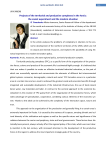
Статья научная
In the article analyzes the problems of complexity in relations to the economic development of the northern territories of the USSR, which are rich in natural and mineral resources, and explores the possibility of using historical experience in a modern innovation policy.
Бесплатно
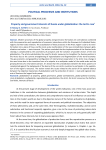
Property and government interests of Russia under globalization: the Arctic case
Статья научная
Modern processes of the global property and governance formation are contradictory combined with the preservation and reproduction of economic interactions within the framework of individual States, regions and inter-state relations. The actualization of these processes in the Arctic region is due to its transformation into a place of focus and the most acute manifestation of the new contradictions between globalization and nation — state interests. The author concluded that the implementation of the Russian Arctic strategy is complicated by the uncertainty of prospects and the variation of possible vectors of the new globalization. The article substantiates the need for drastic measures to strengthen the Russian position in the Arctic due to the current strengthening of regionalization and fragmentation of the world economy. The geo-economic and geopolitical configuration of international cooperation in the Arctic may change in the near future due to the transition from of a unipolar to a multipolar model of the world order and the growing threats of a new hybrid cold war. It’s shown that the contradictions between the Arctic powers are complicated against the background of the desire of the non-Arctic countries to participate in the exploitation of the region's resources. The author reveals the issues related to the search of the optimal balance between the objective imperatives of globalization and the protection of nation — state and regional interests of Russia as the largest Arctic power.
Бесплатно
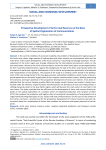
Статья научная
In the current conditions of economic instability, the problem of developing the regional space of the Arctic zone, where huge reserves of hydrocarbons and other minerals are concentrated, which are the main driver of the future development of the Arctic economy, is becoming increasingly important. The development of the Arctic region was strongly influenced by the international environment, which, on the one hand, poses a threat to the Arctic mineral projects, and on the other hand, opens up new opportunities for their successful implementation. Against this background, the task of the Arctic coal industry within the framework of spatial and regional development is the territorial and production optimization of production and transportation of coal products. The purpose of the study is to analyze current trends in the development of the coal mining market in the new geo-economic and political conditions, which results in the proposed approaches to the spatial organization of the transport communications system, allowing maximizing the economic and export potential of the prospective development of Arctic coal reserves. It has been established that the current situation greatly affects the energy market. Russian coal market is being transformed under the influence of geo-economic transformations, the formation of new coal mining centers is shifting eastwards closer to the Asia-Pacific region, which will become the main center of coal trade in the near future. The study concludes that the efficiency of the development of Arctic coal reserves directly depends on the spatial organization of a complex system of integrated production and transport corridors (IPTC) that combine the production and logistics chain of mining and transportation of coal products into a single holistically integrated space of sea, coastal and land communications. On the basis of the analysis of the Taimyr coal basin, a priority level for the prospective development of mineral resources has been determined, based on a combination of factors that condition the economic and export potential of coal deposits.
Бесплатно
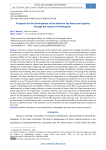
Статья научная
The article outlines the relevance of the research topic related to the strategic orientation, within the framework of which the modernization of the Northern Sea Route and the implementation of major projects in the northern regions and in the Arctic zone are planned. The object of the study is the Northern Sea Route (NSR), and the subject is the analysis of its development prospects. The study is aimed at assessing the current state of the NSR and the role of the Arkhangelsk Oblast, highlighting the advantages of northern maritime logistics and the prospects for its development. This research involved an extensive review of analytical materials, reports from specialized institutions and scientific publications. A mixed methodology was implemented, integrating both qualitative and quantitative approaches. Qualitative methods included observation, interviewing, expert assessments and testing. Quantitative methods, including questionnaires and monitoring, were also used to ensure a comprehensive analysis. Processing of the obtained information was carried out using methods of analysis and synthesis, comparison, as well as an empirical approach. The paper identifies the main directions of cooperation in the Arkhangelsk Oblast related to the reorientation of cargo supplies along the NSR. In the current geopolitical conditions, the use of the NSR capabilities is one of the key priorities in cooperation with the People’s Republic of China. Another promising area of cooperation with the Arkhangelsk Oblast is the development of logistics along the NSR through the seaport of Arkhangelsk with the Republic of Belarus. The importance of the NSR is associated with the establishment of an orderly supply scheme for remote territories of Russia, which will allow forming an integrated approach to the organization of northern delivery. Such promising areas of development of the northern trajectory require modern maritime and land infrastructure. In this regard, the Comprehensive plan for the development of the Arkhangelsk transport hub for the period until 2035 has been adopted. An analysis of the accumulated experience of the NSR operation shows that this route has become an important element in global supply chains in recent years. The potential of the NSR as an alternative route can become a significant factor in the formation of new economic ties and strengthening Russia’s position in the Arctic.
Бесплатно
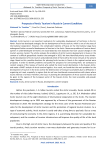
Prospects of Arctic Tourism in Russia in Current Conditions
Статья научная
Arctic tourism is an important mechanism for sustainable development of territories in the Far North. Russia has developed strategies for the development of Arctic tourism, which is one of the areas of international cooperation. However, the complicated relations of Russia on the international stage have endangered further successful development of tourism in the Arctic. Numerous problems of tourism development in underdeveloped territories are exacerbated by new obstacles that have caused changes in the tourism services market. The article analyzes the problems of Arctic tourism development in Russia in the context of a difficult geopolitical situation that emerged in 2022. We have identified priority issues hindering the development of Arctic tourism and predicted which of them will be the most relevant at the present stage. Based on this, possible directions for planning Arctic tourism in Russia in the regional context were proposed. In order to identify problems and justify the prospects for overcoming them, we conducted a content analysis of the reviews of tourists who visited the main tourist destinations in the Russian Arctic, and made a SWOT analysis of Arctic tourism logistics. As a result, we found that the main problem for the development of tourism in the Arctic will be the deterioration of transport accessibility due to difficulties in organizing air travel, especially in regions that do not have land-based communications with places where tourist interest is formed. Therefore, the focus in planning the development of Arctic tourism should now be given to the regions of the European sector of the Russian Arctic, the most accessible and popular among tourists.
Бесплатно
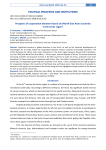
Prospects of cooperation between Russia and North-East Asian countries in the Arctic region
Статья научная
Significant increase in global attention to the Arctic, as well as the intensive development of technologies for its study, makes the cooperation between various countries increasingly important. The article discusses the history and current interaction in the Arctic region between Russia (and its predecessor, the USSR) with North-East Asia (NEA) — China, Japan, and the Republic of Korea. The author noted the increasing scientific and practical interest of the NEA countries to study the Arctic, analyzed it and main aspirations of these countries to cooperate with Russia. Also, the author reviewed the most significant internal laws and regulations governing their activities in the Arctic. It was concluded that the high prospects for cooperation between the countries of Northeast Asia and Russia occur. Main directions of possible interaction in the region are presented in the article along with the highlighted unique position of the Russian Far East as one of the critical links.
Бесплатно
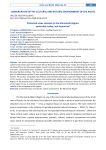
Protected areas network in the Murmansk Region: yesterday, today, and tomorrow
Статья научная
The article represents a retrospective of nature conservation in the Murmansk Region. It is devoted to the period since the first State Nature Reserves to the present day. Today, the network of Protected Areas (PA) in the Murmansk Region consists of three nature state Reserves, one National Park, two natural parks, 12 protected areas “Zakaznik”, 55 nature monuments and the protected area of the Polar-Alpine Botanical Garden-Institute. The total area of the PA is 1,947,799.4 hectares or 13.4% of the Mur-mansk Region. An effectiveness of the PA was assessed due to the correspondence of the protection regimes and the threats. The authors concluded that effective environmental protection could be realized only in small part of PA, mainly in nature state reserves and national park, whose total area is only 4.2% of the Murmansk Region. At the present level of efficiency, even if it will be possible to achieve a share of Pas equal to 16.4% of the region’s area, it is hardly possible to guarantee the proper level of biodiversity conservation and the stability of the ecosystem of the region.
Бесплатно
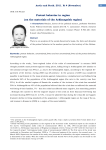
Protest behavior in region (on the materials of the Arkhangelsk region)
Статья научная
There is an analysis of the social discontent's basis, the form and dynamic of the protest behavior in the modern period on the territory of the Arkhangelsk region in article.
Бесплатно

Статья научная
Review of the conference materials “Safety and Sustainable Development of the Arctic Region, the conservation of ecosystems and traditional lifestyles of indigenous peoples of the Arctic” held within the framework of the 5th International meeting of the Arctic Council member states, observer states and international scientific community on the 15th—16th of September 2015 in the town of Arkhangelsk.
Бесплатно
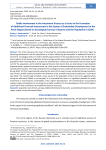
Статья научная
The article discusses the issues of ensuring the sustainable development of the Arctic region by attracting investments from the population as a factor influencing the formation of additional financial instruments. Sociological tools are used to identify opportunities for the population living in the Far North and Arctic regions of the Russian Federation to form savings and the most attractive financial instruments for the population when investing them, to assess the characteristics of financial instruments that are most significant for the population, and to identify regional financial instruments that are alternatives to bank deposits (regional bonds, regional investment funds, etc.) that may be in demand among the population when choosing investment options. The study used data from sociological surveys conducted by the authors in two stages during 2024. The first stage involved analyzing the results of an expert survey conducted among representatives of the scientific community within the framework of the scientific and practical conference “Luzin Readings 2024”. The second stage included a mass survey of the population living in the Arctic agglomerations (using the Murmansk Oblast as an example). It is concluded that there is a significant potential for public investment in improving the sustainability of the region’s development. The transformation of population savings creates prerequisites for ensuring more stable conditions for the development of the Arctic regions, since they fill their economies with additional financial resources.
Бесплатно
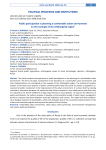
Статья научная
The article analyzes the experience of public participation in the planning of a comfortable urban environment. The forms of public involvement in the formation of a comfortable urban environment and their implementation are considered on the example of the Arkhangelsk region. The method of complex analysis of the theory and practice of public communications helps the article to present a qualitative assessment of public involvement in the improvement of the urban environment. It is shown that the existing methods of interaction between the authorities and citizens represent a one-sided process and often they are reduced to the formal fulfillment of legal requirements by municipalities. To improve the efficiency of public participation, the authors propose to develop a communicative model of urban space management based on constant interaction between municipal authorities and citizens. This model will allow establishing a dialogue between all stakeholders, which will ultimately lead to the successful implementation of the urban environmental program and improve the quality of life of citizens.
Бесплатно

Putin’s breakthrough in Arctic
Статья научная
Ecology, Economy, Security of Russian Arctic − are the strategic and important steps in 2012. It is the beginning of the general cleaning of the Arctic. The Arctic shelf of Russia, Prirazlomnoye. ‛NK ‛Rosneft’: policy towards the strategic partnership with ExxonMobil, Eni and Statoil. To be strong – is the guarantee of the national security.
Бесплатно
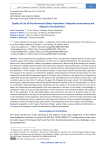
Статья научная
The assessment of the population's quality of life is an important analytical tool of the state socio-economic policy, which allows analyzing the current level of regional development, the population's satisfaction with living conditions, making interregional comparisons, determining shortcomings and prospective directions of public administration. At the same time, objective statistical indicators, on which the state management is based, in many respects may not coincide with the subjectively perceived quality of life of the population. In this context, the presented research is particularly relevant and practically significant. The purpose of the research is to identify the problems of development of the Murmansk Oblast, the most industrially and territorially developed region of the Arctic zone of Russia, on the basis of the comparison of subjectively perceived assessments of the quality of life and objective socio-economic characteristics, and to outline ways to solve them. To achieve this goal, the following tasks were solved: the methodology for assessing the subjectively perceived and statistically determined quality of life of the population on the basis of indicators characterizing personal well-being and the quality of the living environment was developed; the subjectively perceived quality of life was assessed on the basis of the author’s methodology including the results of surveys of the population of cities and towns in the Murmansk Oblast; the quality of life of the population of the Murmansk Oblast was assessed on the basis of statistical data of socio-economic development; the data of the obtained assessments were compared, similarities and differences in the satisfaction of the population with personal well-being (as well as with the living environment) and statistical characteristics were revealed; the most important problems of socio-economic development, the resolution of which will improve the quality of life of the population of the Arctic region, were identified.
Бесплатно
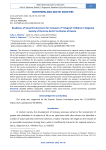
Статья научная
The relevance of studying the state of the social environment of a regional society is determined by the development of inclusive processes that involve the integration of people with disabilities into public life as full members of society. In this regard, it is important to understand the level of readiness of society to include disabled children due to the large-scale disability of the child population and the existing need to create special conditions for the positive socialization of children in this category. The issues of creating inclusive environmental conditions are particularly relevant in Euro-Arctic territories, which are characterized by significant risks to health and quality of life of the population. In order to identify the level of readiness of the social environment of regional society, the article undertakes theoretical and empirical research, including an analysis of the characteristics of the social environment and approaches to determining its accessibility in domestic and foreign studies, the author’s typology of private social environments, as well as an assessment of the state of infrastructural and socio-psychological barriers for children with disabilities based on the results of the author’s online questionnaire survey of the population of the Arctic territories of the Northwestern Federal District conducted in 2022 (n=861, the sample is proportional to the number of residents of the Arctic territories). The survey revealed the existing barriers to inclusion in the studied territories, which is important in the implementation of social policy measures to create a barrier-free environment for the younger generation with persistent health disorders.
Бесплатно
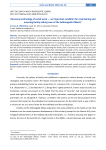
Статья научная
Ensuring the social security of the modern family is an urgent issue and a priority of the national policy of the Russian Federation. In contemporary society, the relationship between the social security system and the resource of the family is visible. Family resource acts as a set of potentials aimed at maintaining the stability of the family and the development of its competence in solving family problems. So, the technology of social work aimed at enhancing the resources of the family is essential. The same is fair for the role of the immediate environment in supporting the family since it becomes an active subject in solving family problems. Such an instrument is restoration technologies focused on the resource potential of the family and the resources of social capital. These technologies are widely used in foreign social work and are a promising area for the Russian one. The use of these technologies can be a factor in increasing the effectiveness of family institutional resources in the social protection of the population. Also, the author analyzed the role of recovery technologies in ensuring the social security of the family and examined the use of these technologies in the Arkhangelsk Oblast.
Бесплатно
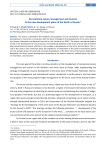
Recreational nature management and tourism in the new development plans of the North of Russia
Статья научная
Тhe article is devoted to the problems and prospects for the recreational nature management development in the Arctic in connection with the state “Strategy for the Development of the Arctic Zone of the Russian Federation and National Security for the Period up to 2020”. The author considered modern trends in the development of cruise tourism, environmental problems of the Arctic and the task of embedding recreational and tourist activities in the complex redevelopment of the Arctic and the North. The result of the study is the conclusion about the expediency of integration of the tourist-recreational sphere into the complex project of social and economic development of the Arctic zone of the Russian Federation.
Бесплатно
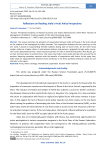
Reflections on Reading: India’s Arctic Policy Perspectives
Статья научная
The review examines the prospects of cooperation between India and Russia in the Arctic based on the analysis of the monograph by Indian scientists. The cooperation between the two countries, on the one hand, is based on long-standing friendly traditions dating back to Soviet times. On the other hand, modern India has a higher status in international relations and pursues a pragmatic foreign policy course. The US has objectively become a more important partner for India in international politics than Russia, given their common desire to contain China. This means that India’s Arctic policy will take into account the US position, balancing secondary sanctions with the benefits of cooperation with Russia. At the same time, India views the rapprochement between China and Russia in the Arctic painfully seeking to realize its own interests in the region.
Бесплатно
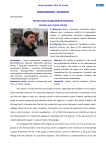
Статья научная
The article is devoted to the social and philosophical analysis of the phenomenon in the region. The author of the system approach considers the region as a social system. Determined by the conceptual, structural and substrate levels of the system. Analyzes the main systematic relationships.
Бесплатно
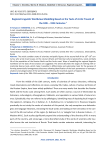
Статья научная
The article considers texts of scientists and public figures of the second half of the 18th–19th centuries, who wrote travel essays on the natural-climatic and historical-cultural peculiarities, social and daily life of the population of the Russian North and the Arctic coast. Ways of modelling the regional linguistic worldview on the basis of text analysis are suggested. The article describes the stages of working with semantically diverse texts, which make it possible to differentiate and systematise texts for the purpose of forming semantically homogeneous discourses allowing identification of the basic parameters of conceptualisation and categorisation of the world objects reflecting the essential aspects of regional life.
Бесплатно


